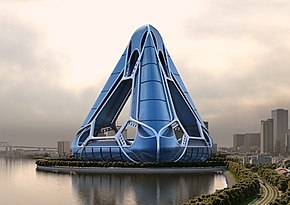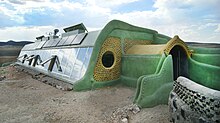Utopian architecture
 From Wikipedia the free encyclopedia
From Wikipedia the free encyclopedia
| Part of a series on |
| Utopias |
|---|
 |
| Mythical and religious |
| Literature |
| Theory |
| Concepts |
| Practice |
|
Utopian architecture is architecture inspired by utopianism.[1] Examples for such an architecture are Phalanstère, Arcology and Garden Cities. Earthships are realizations of the utopia of sustainable living and autonomous housing.[2] Also, the concept domed city functions as a potential utopia.[3]
Examples
[edit]Le Corbusier proposed Ville Contemporaine in 1922 as a planned community, which was not realized.[4] In 1930, Nikolay Milyutin published the idea of Sotsgorod, a utopian linear city for socialism.[5] Frank Lloyd Wright presented the idea of an urban or suburban development concept Broadacre City in 1932.[6]
From 1927 to 1934, Tresigallo was transformed under the supervision of the Fascist Minister of Agriculture Edmondo Rossoni into a utopian city by completely rebuilding it.[7][8][9]
Tomáš Baťa developed the concept of a utopian industrial town in the 1920s and 1930s.[10] It was similar to Fordism, introducing mass production into the area of urban planning. The concept was realized in Zlín.
Nowa Huta and Magnitogorsk are examples of entirely planned utopian socialist ideal cities.[11] In January 2021, Saudi Arabia released a short film about plans of a smart linear city The Line, a utopian dream of a postmodern ecotopia.[12] In September 2021, American billionaire Marc Lore announced Telosa, a utopian planned US city.[13][14]
Revolutionary architecture
[edit]Revolutionary architecture refers to the type of architecture that seeks to challenge or overthrow the existing social, political, and economic order through the built environment.[15] It often aims to create spaces that promote social justice, equity, and freedom. Revolutionary architecture is equated with utopian architecture due to insuperable constraints of capitalism.[15][16] Utopianism played a significant role in the emergence of revolutionary architecture.[17]
Exhibitions
[edit]In July 2018 MoMA opened a 6-month exhibition entitled "Toward a Concrete Utopia" that provided visitors with a large collection of images, architectural models, and drawings from Architecture of Yugoslavia from 1948 to 1980.[18] In June 2022, Prof. Leonhard Schenk organized an exhibition of utopian city planning concepts during Long Night of the Sciences in Kreuzlingen.[19]
 |  |  |
See also
[edit]- Brutalist architecture
- Ecomodernism
- Sotsgorod: Cities for Utopia
- The Almost Nearly Perfect People
- Totalitarian architecture
- Utopia for Realists
References
[edit]- ^ GREEN, ERNEST J. (1993). "The Social Functions of Utopian Architecture". Utopian Studies. 4 (1): 1–13. ISSN 1045-991X. JSTOR 20719143. Retrieved 19 September 2021.
- ^ Booth, Colin A.; Rasheed, Sona; Mahamadu, Abdul-Majeed; Horry, Rosemary; Manu, Patrick; Awuah, Kwasi Gyau Baffour; Aboagye-Nimo, Emmanuel; Georgakis, Panagiotis (September 2021). "Insights into Public Perceptions of Earthship Buildings as Alternative Homes". Buildings. 11 (9): 377. doi:10.3390/buildings11090377. hdl:2436/625021. ISSN 2075-5309.
- ^ Squire, Rachael; Adey, Peter; Jensen, Rikke Bjerg (23 November 2018). "Dome, sweet home: climate shelters past, present and future". Nature. doi:10.1038/d41586-018-07513-8. S2CID 165784571.
- ^ Angelidou, Margarita (1 September 2015). "Smart cities: A conjuncture of four forces". Cities. 47: 95–106. doi:10.1016/j.cities.2015.05.004. ISSN 0264-2751. Retrieved 15 May 2022.
- ^ Ilchenko, Mikhail (1 November 2020). "Working with the past, re-discovering cities of Central and Eastern Europe: cultural urbanism and new representations of modernist urban areas". Eurasian Geography and Economics. 61 (6): 763–793. doi:10.1080/15387216.2020.1785907. ISSN 1538-7216. S2CID 225622478. Retrieved 15 May 2022.
- ^ Dougherty, James (1981). "Broadacre City: Frank Lloyd Wright's Utopia". The Centennial Review. 25 (3): 239–256. ISSN 0162-0177. JSTOR 23739336. Retrieved 15 May 2022.
- ^ Sakalis, Alex (9 September 2022). "The Curious Afterlife of a Fascist Utopia". Atlas Obscura. Retrieved 24 September 2022.
- ^ Brugnatti, Davide; Muroni, Giuseppe (2020). "Edmondo Rossoni and Tresigallo: An Atypical Case of a Regime Town". Ex Novo: Journal of Archaeology. 5: 33–45. doi:10.32028/exnovo.v5i.410. ISSN 2531-8810. S2CID 236390951.
- ^ Muroni, Stefano (2016). Tresigallo, città di fondazione : Edmondo Rossoni e la storia di un sogno (in Italian). Bologna: Pendragon. ISBN 978-88-3364-985-6. OCLC 1055462507.
- ^ Zimmermann, Clemens (September 2013). Industrial Cities: History and Future. Campus Verlag. ISBN 978-3-593-39914-0. Retrieved 16 May 2022.
- ^ "Nowa Huta: Kraków's Socialist Realism Suburb". www.inyourpocket.com. Retrieved 21 December 2021.
- ^ Worth, Robert F. (28 January 2021). "The Dark Reality Behind Saudi Arabia's Utopian Dreams". The New York Times. Retrieved 18 May 2022.
- ^ Holland, Oscar (6 September 2021). "Plans for $400-billion new city in the American desert unveiled". CNN. Archived from the original on 7 September 2021. Retrieved 7 September 2021.
- ^ Del Rey, Jason (15 January 2021). "Walmart's e-commerce chief is leaving to build 'a city of the future'". Vox. Archived from the original on 31 January 2021. Retrieved 7 September 2021.
- ^ a b De Stefani Casanova, Patricio (2013). Emancipatory horizons: The possibility of a revolutionary architectural practice (mphil). University of Liverpool.
- ^ Jameson, Fredric (1985). "Architecture and the Critique of Ideology". Architecture, Criticism, Ideology. 64.
- ^ Yakar, Ali Güney (2021). "Konstrüktivist Mimarlığın Reel ve Ütopya Düzleminde Mekânsal İncelemesi". TR-Dizin İndeksli Yayınlar Koleksiyonu. ISSN 1302-2636.
- ^ Farago, Jason (2018-07-19). "The Cement Mixer as Muse". The New York Times. ISSN 0362-4331. Retrieved 2019-01-31.
- ^ "Visit Utopia – Stadtvisionen der Vergangenheit". www.htwg-konstanz.de (in German). Retrieved 18 September 2022.
- ^ Seth, Radhika (2009-08-17). "Heavenly Abode - Yanko Design". www.yankodesign.com. Retrieved 2022-09-06.